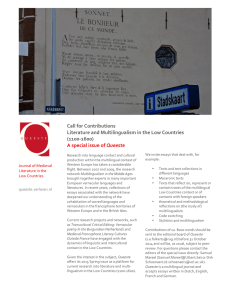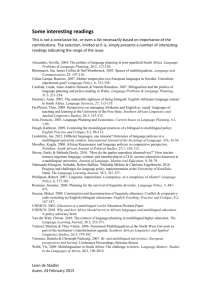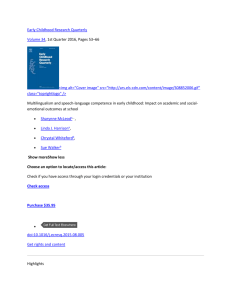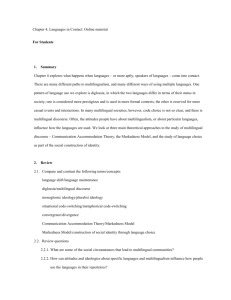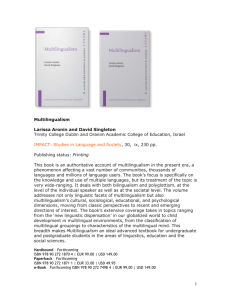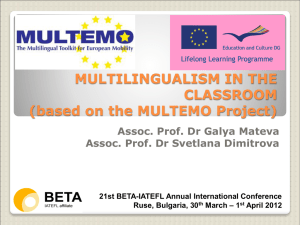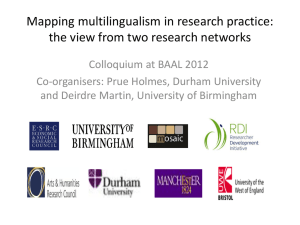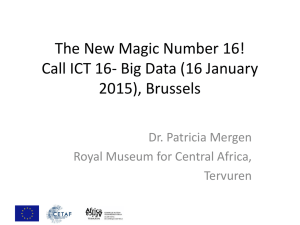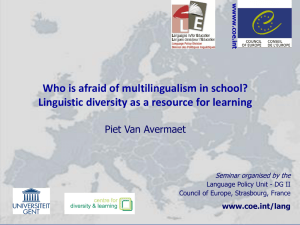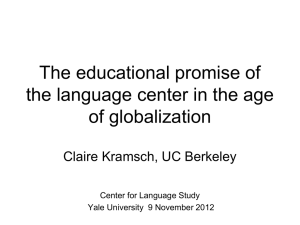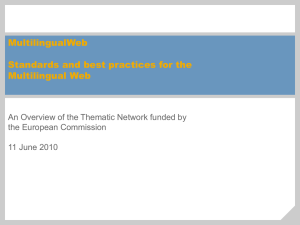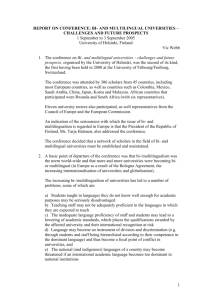11th International Language and Development
advertisement
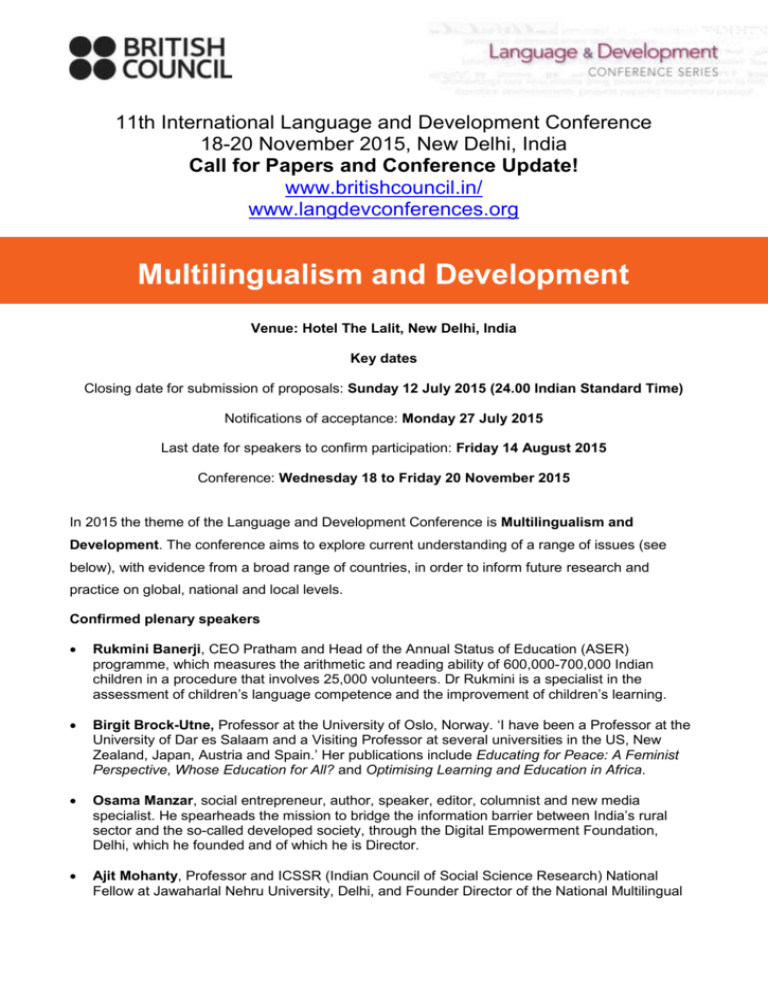
11th International Language and Development Conference 18-20 November 2015, New Delhi, India Call for Papers and Conference Update! www.britishcouncil.in/ www.langdevconferences.org Multilingualism and Development Venue: Hotel The Lalit, New Delhi, India Key dates Closing date for submission of proposals: Sunday 12 July 2015 (24.00 Indian Standard Time) Notifications of acceptance: Monday 27 July 2015 Last date for speakers to confirm participation: Friday 14 August 2015 Conference: Wednesday 18 to Friday 20 November 2015 In 2015 the theme of the Language and Development Conference is Multilingualism and Development. The conference aims to explore current understanding of a range of issues (see below), with evidence from a broad range of countries, in order to inform future research and practice on global, national and local levels. Confirmed plenary speakers Rukmini Banerji, CEO Pratham and Head of the Annual Status of Education (ASER) programme, which measures the arithmetic and reading ability of 600,000-700,000 Indian children in a procedure that involves 25,000 volunteers. Dr Rukmini is a specialist in the assessment of children’s language competence and the improvement of children’s learning. Birgit Brock-Utne, Professor at the University of Oslo, Norway. ‘I have been a Professor at the University of Dar es Salaam and a Visiting Professor at several universities in the US, New Zealand, Japan, Austria and Spain.’ Her publications include Educating for Peace: A Feminist Perspective, Whose Education for All? and Optimising Learning and Education in Africa. Osama Manzar, social entrepreneur, author, speaker, editor, columnist and new media specialist. He spearheads the mission to bridge the information barrier between India’s rural sector and the so-called developed society, through the Digital Empowerment Foundation, Delhi, which he founded and of which he is Director. Ajit Mohanty, Professor and ICSSR (Indian Council of Social Science Research) National Fellow at Jawaharlal Nehru University, Delhi, and Founder Director of the National Multilingual Research Centre. His publications include Multilingual Education for Social Justice and Psychology of Poverty and Disadvantage. Srikant Sarangi, Professor in Humanities & Medicine in Aalborg University, Denmark, and Director of the Danish Institute of Humanities & Medicine. ‘I research institutional/professional discourse studies and applied linguistics. I am author and editor of twelve books and editor of three journals.’ James Simpson, Senior Lecturer, University of Leeds, UK. ‘I research language learning and migration. I am the co-author of ESOL: A Critical Guide, editor of The Routledge Handbook of Applied Linguistics and co-editor of Adult Language Education and Migration.’ The context In 1984 DP Pattanayak, the first Director of the Central Institute of Indian Languages, made this deliberately provocative statement about the ubiquity of multilingualism in developing countries: In the developed world … two languages are considered a nuisance, three languages uneconomic and many languages absurd. In multilingual countries, many languages are facts of life; any restriction in the choice of language is a nuisance; and one language is not only uneconomic, it is absurd. Pattanayak’s generalisation about the ‘developed world’ no longer holds true, but it is certainly the case that linguistic diversity is a fact of life in developing countries. India is a good example, with two official languages, 22 languages ‘scheduled’ in the Indian Constitution, and a further 780 languages estimated to be in everyday use. India is therefore a highly appropriate context in which to hold an international conference on multilingualism and development. Since 2010 more than half of the world’s population has been living in urban areas and, by 2050, 66 per cent of people will be living in cities. Developing countries throughout Asia, Africa and Latin America face multiple challenges, including providing access to quality healthcare, education and opportunities for sustainable livelihoods for their people. The increasing cultural and linguistic diversity of urban centres raises critical issues, such as the language requirements necessary to provide minimum safety and security to migrants, access to civic amenities and public services, and support for the transition to urban lifestyles and consequent requisite life skills. Megacities and cities throughout the developing world experience similar challenges of linguistic super-diversity. Again, India provides an illustration: rapid urbanisation means that by 2031 it is predicted that India will have 70 of the world’s 100 most populous urban centres. The rapid growth of technology has been a significant factor in many developing countries, particularly through widespread access to mobile telephones and the Internet. This presents huge potential to leapfrog more traditional forms of information access and dissemination. However there are clear implications for the diversity of the linguistic landscape. Much information shared on the Internet and through other digital channels is available only in majority languages, in particular English. Questions remain about how this imbalance can be redressed or whether there will continue to be a digital divide, with speakers of minority languages at a significant disadvantage. A recent example has been the urgent need to provide information about Ebola in multiple West African languages and their respective writing systems - and to make that information available on mobile phones and through other media. In addition, there is growing recognition of the impact of multilingualism on marginalised groups, including women, indigenous peoples (referred to as ‘tribal groups’ in India) and speakers of minority languages, all of whom are at risk of being denied full access to health, education, other government services, legal redress and participation in democratic processes if these are possible only through mainstream languages. A related issue is the rapidly growing phenomenon in many developing countries – including India and Pakistan – of demand for private ‘English-medium’ schooling, fuelled by parental dissatisfaction with education provided through the national language by free state schools. Some parents from the poorest and most marginalised groups are willing to pay for this so-called ‘English-medium’ schooling, even though it may be of dubious quality. Sub-themes The conference will focus on the issues highlighted above. Attention will not be restricted to any particular sector and so the conference will look at the role that language plays in multilingual contexts in interactions with local government service providers, involvement with the legal system, undertaking cross border trade, taking part in other informal sector economic activities, accessing health care and education, obtaining access to the law, participating in democratic processes at local and national levels, consuming and contributing to the media at local and national levels, and so on. The conference will also present an opportunity to examine the extent to which developments in research, policy and practice in the linguistically super-diverse cities of developed countries have relevance for highly diverse multilingual contexts in Asia, Africa and Latin America. In the specific context of education, mother-tongue-based multilingual education (MTB MLE) is now well established as an appropriate policy: the mother tongue is used as the medium of instruction in the first years of schooling and then children are helped to gradually transition to a national or global language in later years. Examples, including Guatemala and the Philippines, show that this approach reduces drop out and repetition rates, strengthens home-school communication and increases learner and teacher motivation. The benefits of MTB MLE have been thoroughly explored in several recent international conferences, including the 2nd and 3rd Conferences on Language, Education and Development (Bangkok 2010 and 2013) and the 9th and 10th Language and Development Conferences (Colombo 2011 and Cape Town 2013). However, these multilingual education success stories tend to be found in relatively homogeneous rural contexts and particularly among minority language groups. It is hoped that the New Delhi Conference will go beyond this in two ways, by examining multilingualism (including the feasibility of MTB MLE) in linguistically super-diverse urban contexts and by exploring multilingualism in a wide gamut of contexts (not only in education). The conference therefore has three sub-themes. 1. Multilingualism and the metropolis The issues that might be addressed include but are not limited to the following: Identifying and describing the linguistic implications of urbanisation The benefits of linguistic hyperdiversity Linguistic barriers experienced by migrant populations in urban contexts How schools, health clinics and other government services cater for speakers of dozens of different languages in super-diverse urban contexts The practice of MTB MLE - and the capacity of schools to provide it - in multilingual urban contexts Social division as an unintended consequence of MTB MLE in multilingual contexts Multilingualism in semi-urban and urban non-metropolitan contexts 2. Language, technology and multi-literacies This sub-theme may explore issues such as (but not restricted) to the following: Digital media as threat or opportunity for minority languages Digital media and non-Latin-based writing systems The use of digital media at times of crisis and natural disasters, especially in multilingual societies Digital media and language choice in education Digital literacy, language and gender 3. Multilingualism, marginalisation and empowerment Under this heading issues such as (but not limited to) these may arise: The tension between ideas of ‘development’ and formal education systems Educating girls and empowering women in multilingual societies Endangered languages and endangered livelihoods Language, identity and violence The role of parents in multilingual contexts Multilingualism in rural contexts, particularly in the context of accessing markets Prospects for indigenous peoples (‘tribal groups’) and speakers of minority languages in multilingual nations The roles of English in multilingual developing countries: empowering or marginalising? Describing and responding to the phenomenon of low cost private English-medium schools catering to the economically marginalised Presenters The conference will consist of plenary presentations by eminent guest speakers, parallel sessions, debates and panel discussions. Participants It is expected that about 250 speakers and delegates will participate in the conference. The event will be of interest to professionals working in development in multilingual contexts, including project and programme implementers, key influencers and policy makers, senior ministry officials, consultants, researchers and other change agents involved in the fields of language, education, skills and employment, health, law, democratic processes and the media. Participants will come from India, other parts of South Asia and around the world. Conference outputs and publication The conference will generate a provisional agenda for further investigation of issues relating to multilingualism and development and for action by policy makers. An edited selection of the most important plenary and parallel presentations will be published by the British Council in India in 2016. This volume will incorporate the final version of the agenda for research and action. It will join the prestigious series of publications from the ten previous conferences which are available for download from the websites of the Language and Development Conferences (www.langdevconferences.org) and the British Council (www.teachingenglish.org.uk/publications). A series of post-conference events will be planned to take place during 2016. These events will draw on the agenda for research and action and on other elements in the conference publication. Venue, registration and conference fee The conference will be held in Hotel The Lalit, New Delhi, located just a short stroll away from Connaught Place and with easy access to the Metro system. Go to www.britishcouncil.in to register and to www.langdevconferences.org for the latest information. Speaker and Delegate categories Early bird fee Regular fee Currency payable India and SAARC countries INR 8000 INR 10000 INR or GBP equivalent International speakers and delegates GBP 150 GBP 200 GBP or USD equivalent Registrations open: early June 2015 Early bird deadline: Monday 31 August 2015 Registrations close: Monday 2 November
